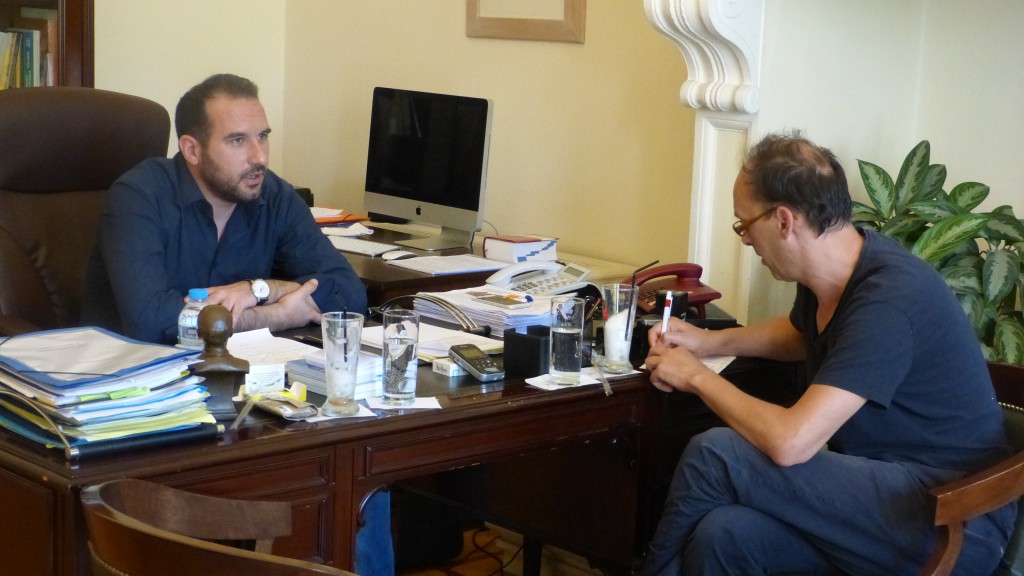Un reportaj din mijlocul Syrizei care poate ajuta la conturarea unei imagini mai nuanțate despre Syriza și situația din Grecia decât cea pe care o promovează media locală.
My Greece. The Journey Inside Syriza.
Days of Decision. While the Greek drama moved towards a decision, I travelled into the interior of the new Greece. Meetings with Alexis Tsipras, his closest aids, local activists, young businessmen, working-class militants and people, who just manage to survive.
Translation: Barbara Stanzl. The German Version of this Essay you can find here.
You want support that kind of journalism? So please help to crowdfund this report and further researches: Bankaccount: Robert Misik. IBAN AT 301200050386142129 / BIC= BKAUATWW
 “To our government,” Nikos shouts, slightly sarcastically. While we are lifting our beers, Katerina adds with an additional pinch of irony and a touch of bitterness, “It’s high time that we actually start to govern.” We’re sitting at the Café Stretto in Thessaloniki and the Greece Emergency crisis summit with EU Zone leaders from last Monday evening had just finished. The latest news is coming in. There are indications that Alexis Tsipras has in fact moved his position in the direction the creditors want and that an agreement isn’t far away. Details are still lacking at this point.
“To our government,” Nikos shouts, slightly sarcastically. While we are lifting our beers, Katerina adds with an additional pinch of irony and a touch of bitterness, “It’s high time that we actually start to govern.” We’re sitting at the Café Stretto in Thessaloniki and the Greece Emergency crisis summit with EU Zone leaders from last Monday evening had just finished. The latest news is coming in. There are indications that Alexis Tsipras has in fact moved his position in the direction the creditors want and that an agreement isn’t far away. Details are still lacking at this point.
The next morning laughter has been replaced by shock. Katerina Notopoulous’s mobile rings every minute. The 27 year old is a member of the central committee of the governing Syriza party.
We actually wanted to take the day off and drive to the coast. „Thank you Merkel and Alexis. You’ve screwed up my day,“ she says, between two telephone calls, with a strained grin and a sour face. The calls are from two outraged party members who can’t believe that the Tsipras government could agree to a new and fatal austerity program of over eight billion euros. I’m tearing along the bumpy streets to Chalkidiki in our little Fiat.
An austerity program which only prolongs fears and makes everything worse? A more of the same, more harsh medicine? Hardly anybody can imagine at the moment how Tsipras is going to get the agreement past his party or his group in parliament. It seems to the Syriza functionaries that they have the choice of two nightmare scenarios, either supporting an agreement that is almost criminally irresponsible or voting against it and bringing down the government.
“I’m scared,” whispers Nikos, the local party secretary. “We can’t defend this agreement, it’s impossible,” says Katerina and shrugs. There are a lot of rumours: Tsipras wants to agree because he doesn’t want to be the one who leads Greece out of the Eurozone. Yanis Varoufakis the finance minister and Euclid Tsakalotos the chief economic spokesman are said to be strictly against the agreement.
Athens, a few days beforehand. The sun is beating down on Maximos Mansion. The official residence of the Greek prime minister looks a little like a shrunken version of the White House. Left and right, palm trees are shimmering in the heat. Here too, on a Saturday morning, the revolution is very slowly progressing. It’s a revolution of its own particular kind but what does it want? Stop the austerity trend in Europe? Save Greece? Or even try a contemporary form of socialism?
I’m walking through the side entrance and through the entrance control upstairs into the domain of Alexis Tsipras. The young woman in the hallway is smiling. In Austria you would call her a secretary or receptionist, but in a socialist party like Syriza, whose activists are all used to opposition but who have suddenly ended up in the government, it would be a little inappropriate. In the language of the left, she would more likely be called a comrade who organises the office. Here German is the second lingua franca. Many people have studied in Germany, quite a few have grown up in Germany and speak with a Berlin or a north German accent. “We talk in German when we speak about secret issues so that the civil servants can’t understand us,” a Syriza worker told me and laughed.
Naturally, Dimitris Tzanakopoulos also speaks German. His official job title is “general secretary of the prime minister” which is something like the chief of the chancellery, Tsipras‘ right hand. If the threads of the new power around the modern, smart and young group of men around Tsipras, Tzanakopoulos and state minister Nikos Pappas connect anywhere, they connect here. “We practically had to negotiate the most difficult issues from day one, with our back to the wall and it’s the very first time for us that we’ve been part of a government,” he says, remembering the days when Alexis Tsipras moved into government headquarters in January. “We had no experience whatsoever. They were difficult times.”
 “We on the left are always in opposition,” I’m thinking aloud. “Yes that’s in our DNA,” Tzanakopoulos laughs. “People on the left have a kind of opposition gene and in particular an anti-establishment alliance like Syriza is. Eight years ago they were down at eight percent. To actually govern and be in power is something else,” says Tzanakopoulos. “Actual power is more like a labyrinth than a hierarchy.“ Ironic look, shirt, jeans, stubble, the Syriza strategist wouldn’t be noticed in a trendy hipster bar. Syriza holds undisputed power in Greece but, as the party of the left, it still feels like it’s in opposition to the “current ascendancy of neoliberal thought” however you want to term it and, with the Europeans acting in concert, the Greek government is in opposition to the group of countries who are in the driving seat. They are the governing opposition or the opposition in government. This characterises their identity and their style. Tzanakopoulos, Pappas, Tsipras are the pragmatists amongst this governing opposition. Without a certain feeling for what is possible and some special skills, for example being able to communicate with the Greek public, they wouldn’t have come this far and the last five months were a crash course in “European reality” which means that they’ve also learned to judge the limits of their opponents, whether somebody is perhaps a potential ally or absolutely opposed to them. Or you could say that they’ve gotten a bit better at it.
“We on the left are always in opposition,” I’m thinking aloud. “Yes that’s in our DNA,” Tzanakopoulos laughs. “People on the left have a kind of opposition gene and in particular an anti-establishment alliance like Syriza is. Eight years ago they were down at eight percent. To actually govern and be in power is something else,” says Tzanakopoulos. “Actual power is more like a labyrinth than a hierarchy.“ Ironic look, shirt, jeans, stubble, the Syriza strategist wouldn’t be noticed in a trendy hipster bar. Syriza holds undisputed power in Greece but, as the party of the left, it still feels like it’s in opposition to the “current ascendancy of neoliberal thought” however you want to term it and, with the Europeans acting in concert, the Greek government is in opposition to the group of countries who are in the driving seat. They are the governing opposition or the opposition in government. This characterises their identity and their style. Tzanakopoulos, Pappas, Tsipras are the pragmatists amongst this governing opposition. Without a certain feeling for what is possible and some special skills, for example being able to communicate with the Greek public, they wouldn’t have come this far and the last five months were a crash course in “European reality” which means that they’ve also learned to judge the limits of their opponents, whether somebody is perhaps a potential ally or absolutely opposed to them. Or you could say that they’ve gotten a bit better at it.
Sometimes I also wonder if they have the wrong impression of the hairline political cracks within Europe. Did this government of the left, who only really wanted to run a text-book, socialist, Keynesian economic policy, have to isolate themselves like this? Maybe more would have been possible. “The neoliberals have had the upper hand in Europe for thirty years and we want to move away from that, in form as well as substance,” Tzanakopoulos replies. Which means away from not only the chronic redistribution of all resources and opportunities from the underprivileged to the already privileged, but also a style of government that is fixated on attacking democracy, pacification of the public and the redistribution of all power upwards. In other words more justice and more democracy. If you want that, says Tzanakopoulos, you can’t expect, within neoliberal technocratic Europe, that the potential allies will come running to you. “These are political mechanisms that, in the end, disenfranchise whole nations, and you can’t change them all within four months.”
Tzakanopoulos is one of these smart people on the left who know what they wanted but also know that in reality you can’t get it by banging your head against the wall. I’m still not fully convinced by his reasons. Of course it was difficult for the Syriza party members to find allies in the European establishment but couldn’t they get at least a bit more support? Is it a little bit their own fault that they are facing a hard front of the diametrically opposed in Brussels? I think the closest circle around Tsipras has got a pretty good idea of the possible cracks within this front but most people in the party view anything beyond the Greek world and the world of the friends on the left as only enemies and opponents, which makes them a little insensitive when it comes to finding the right partner. The fact that there is a general feeling in Greece that they are being forced to endure an almost neocolonial arrogance from the other European states, a feeling which isn’t just imaginary but which can sometimes provoke reciprocal antagonism, just for the sake of it. This even happens with the small things. “They are so complicated,” a staff member of a West European chancellery told me and said that the Greek government pays too much attention to the agenda, as if we still lived in the times of the Viennese congress, while nowadays most chancelleries take it pretty easy. I explained to him that it’s because they constantly sense arrogance and therefore make sure that they are treated formally, as equals. He got it then, but up to that point he had not understood.
Continuarea aici
